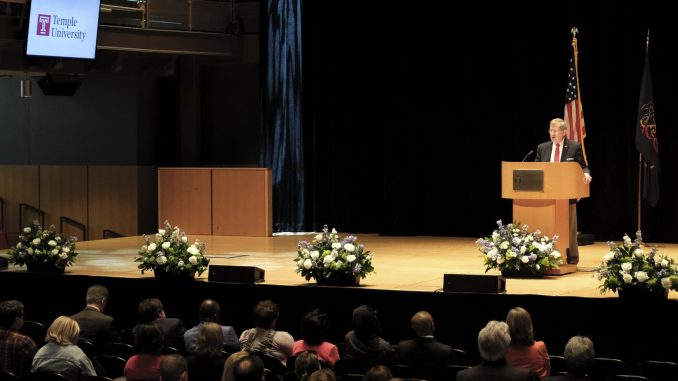
President Richard Englert praised the university for all it has accomplished halfway through its 10-year campus master plan and discussed future plans to expand facilities at his annual State of the University Address in the Temple Performing Arts Center Thursday.
The Charles Library was front-and-center in Englert’s speech, its mention garnering numerous rounds of applause. Temple is setting a new standard for university libraries of the future with the completion of the library, Englert said.
“We dared to dream big, much bigger than most, to dream of a library that is second-to-none in academia,” he said. “The stature of the Charles Library literally catapults Temple University and the entire city of Philadelphia to a much higher level of leadership in learning, in research and innovation.”
Construction on the library began in 2015 before it opened to students at the beginning of this academic year.
Englert also outlined the ongoing collaboration with Thomas Jefferson University and Temple’s University Health System, highlighting Temple’s sale of Fox Chase Cancer Cancer and its stake in Health Partners Plan, a local nonprofit health insurance organization, to Jefferson University, which was announced in July.
Englert also envisioned future collaborations with Jefferson University in non-TUHS areas, he said, but did not provide specifics on what that collaboration would look like.
Praising former Board of Trustees chairman Patrick O’Connor for his “excellent service,” Englert remembered Temple’s history since he attended the school in the 1970s as a time of “careful planning and execution.” Mitchell Morgan replaced O’Connor as chairman of the Board in August.
“Many of us remember the days when Temple University was a much smaller school, and the entire city of Philadelphia was no taller than William Penn’s hat,” Englert said. “Since then, our city and our great university has grown and become world class in so many ways.”
Englert cited the Charles Library and the refurbished Bell Tower as examples of recent campus construction achievements, adding that Temple will build quad space in front of the Charles library.
Englert also announced plans to build the Alpha Center, an early childhood education, dental and behavioral health center that had been stalled in approval by City Council last year due to criticism from the surrounding community.
Englert also praised the campus’s climate action plan, which aims to reduce carbon emissions at the university by 80 percent by 2050, and the university’s smoke-free policy, a ban on all tobacco and vape product use on Main Campus that university began enforcing this semester.
He also praised the university’s achievement of Carnegie R1 research status, recounting the accomplishments of several of Temple’s research projects, including a TUHS team’s breakthrough in the search for a cure for HIV/AIDS during the summer.
Temple’s enrollment increased by 2,000 students to 39,000 total in the past five years, Englert said, though he cautioned that recruitment is becoming more difficult as college enrollment across the country continues to decline, adding that recruitment of potential students is everyone’s responsibility here at the university.
“Temple has never looked more appealing to prospective students and our accomplishments have never been greater, but it is also more important now more than ever to let potential students see and hear that,” Englert said.
Englert also praised Temple’s efforts in outreach to the community, including the university’s formation of a Special Services District last spring, its hosting of Philadelphia Free Streets, an outdoor activities fair, for two consecutive years, and Temple’s 13th annual job fair, which attracted more than 140 employers and 1000 job seekers, Englert said.
“Everything we can do to be good neighbors, we need to do, and that is students talking to students,” he said.


We the community will continue to fight against the stadium as well as the Alpha center. Temple will not continue to take over our neighborhood.